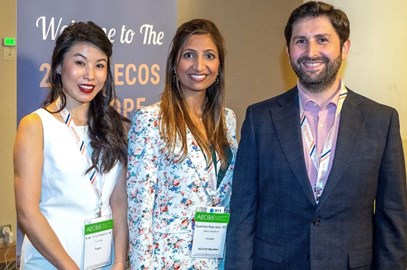After waiting with bated breath, and more than 6 months of planning, the AECOS European Symposium arrived. It proved, from start to end, a wonderful melting pot of leadership, key opinion leaders and budding relationships with industry. The meeting kicked off with introduction of new technologies and latest innovations in ophthalmology. We were presented with “Bynocs”, a cloud-based application for treatment of amblyopia with the highlight being high success rate in adults. Professor Sorcha Ni Dhubhghaill reported a potential role of “Endoart”, an artificial corneal endothelial layer in the management of high-risk cases following multiple failed grafts.
IMVIS promises to change the future of slit-lamp examination by using a remotely operated three-dimensional screen that requires no special eyewear to examine the eye in high-definition. The “LENSPEAK” session focused on categorisation of high-performance intraocular lenses. The AECOS team provided strong arguments to benefit all parties: patients, surgeons, and manufacturers, with representatives from FDA Ophthalmic devices division as well as the ANSI providing constructive discussion. The “Judgement Day” was unlike any other session, being both most entertaining and very insightful. Under the gavel of John Marshal, the experts argued their cases for and against controversial topics such as bilateral sequential ICL surgery, as well as refractive lens exchange for hyperopia correction in young non-presbyopic patients.

[L-R: Tanya Trinh, Radhika Rampat, David Shahnazaryan]
Arguably, the “Young Ophthalmologists” session was one of the most successful and well received at AECOS. The highlight of the session was the keynote lecture by Tania Trinh on gender bias and imposter syndrome. Ashiyana Nariani shared her life’s dedication to admirably serving disadvantaged communities in India. Last but not the least was the session dedicated to “Sustainability in Ophthalmology”. We heard from world-leading sustainability experts on how we can reduce our carbon footprint in ophthalmology. David Chang, a global sustainability champion, gave an inspirational talk highlighting a recent breakthrough of consensus among all 50 state boards of ophthalmology in the US, on how to reduce multi-use topical drug waste in ophthalmic surgery.
Another major success was reported by Sandro di Simplicio, an ophthalmologist based in Newcastle, UK, with the achievement of the first carbon-neutral cataract surgery service in the world. A landmark study by R. Venkatesh reported not long ago that in the UK, a routine cataract surgery, the most common elective procedure globally, generates 20 times more carbon footprint than at Aravind Eye Care System in India with comparable outcomes. The session was a huge success and has inspired the creation of a Green Working Group within AECOS, chaired by us, that aims to further contribute to this most important issue.



